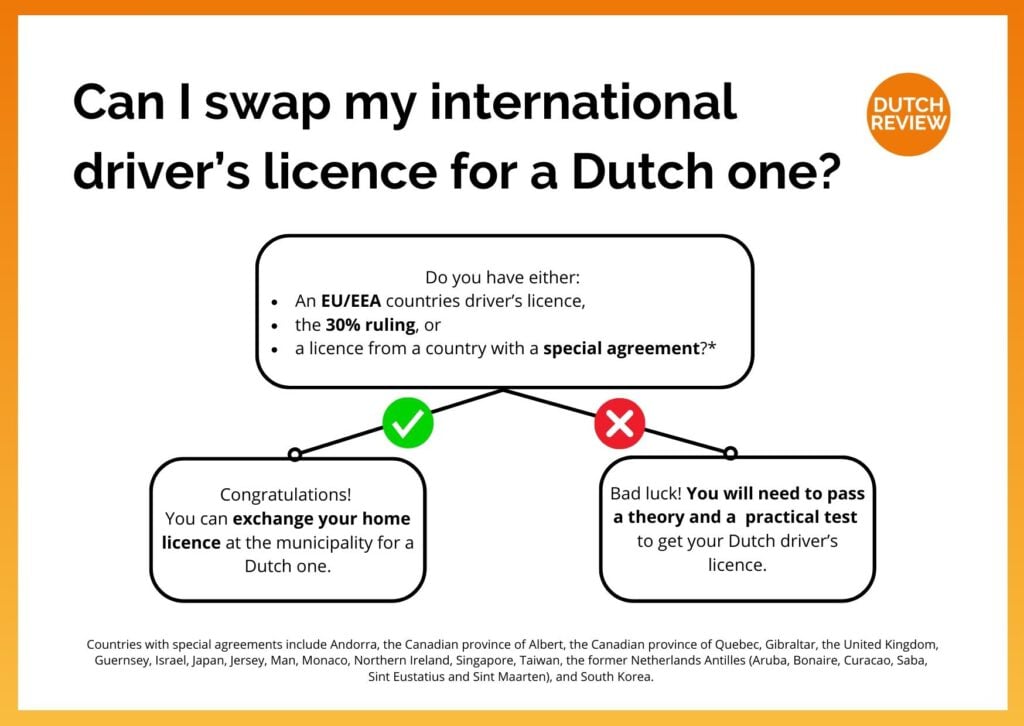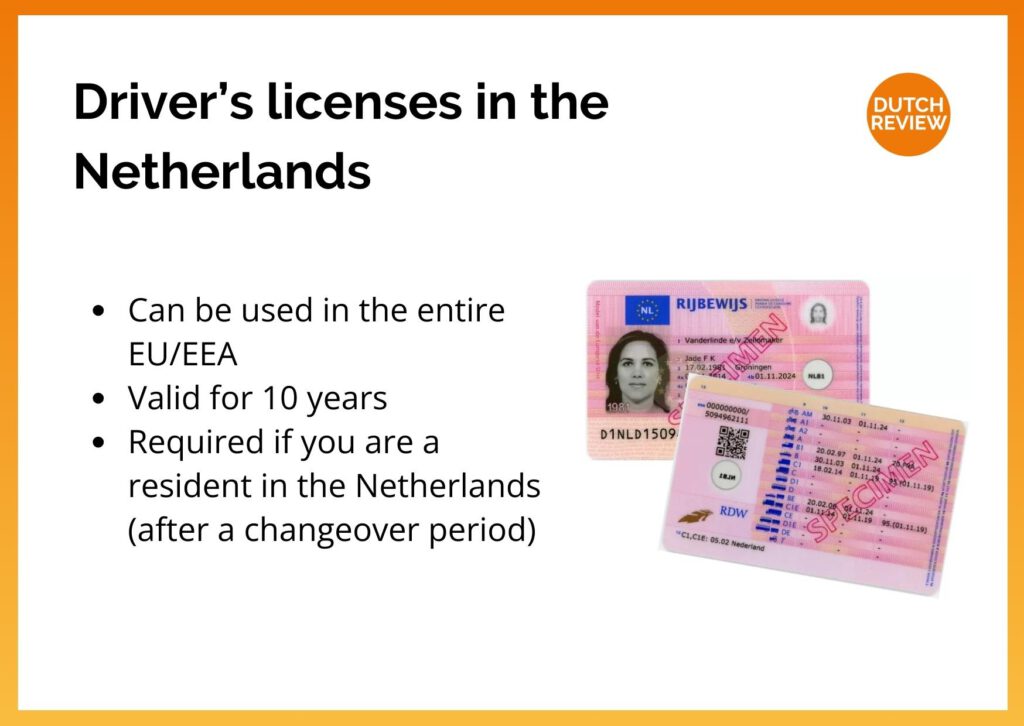So, you’re in the Netherlands and thinking about hitting the road. But how long will it really take to get that shiny Dutch driver’s licence in your wallet?
Whether you’re swapping your foreign licence or starting from scratch with lessons and exams, the Dutch system isn’t exactly a speedway — but it doesn’t have to feel like peak hour traffic either.
Let’s look at how much time you’ll need to get your driver’s licence in the Netherlands, from the first lesson to hitting the road.
How long does it take for internationals to get a Dutch driver’s licence?
If you need to go through the full Dutch licensing process — that’s theory exam, driving lessons, and a practical exam — it usually takes three to six months.
Your timeline will depend on how often you can take lessons, waiting times at the Central Office for Driving Licenses (CBR), and whether you pass everything on the first try.
If you’re lucky enough to be eligible for a licence exchange (say, you’re from an EU/EEA country or fall under the 30% ruling), you could be holding your Dutch licence in as little as three to four weeks. That includes processing time by the RDW and your local municipality.

The steps to getting a Dutch driver’s licence
If you’re not eligible to swap a licence from another country, here’s what you’ll need to do:
- Study for the theory exam: You’ll need to understand Dutch traffic laws, signs, and safe driving practices. You can use books, apps, or take a course to study.
- Book and pass the theory exam: This is done via the CBR website. You’ll take a computer-based test, and you’ll need to pass all sections to move forward.
- Take driving lessons: Most learners need between 39 and 43 hours, but experienced drivers might need fewer.
- Book and pass the practical driving exam: Also through the CBR. You’ll need to demonstrate safe and confident driving under exam conditions.
- Apply for your licence at the municipality: Once you’ve passed, head to your local gemeente to apply for your Dutch licence. It takes five working days to be ready.
In a hurry? Some schools offer crash courses or fast-track options. They’re intense, but if you’re ready for it, they can save you weeks or months.
The Dutch driving theory exam: How long does it take to pass?
The theory exam is your first real hurdle — and it sets the pace for everything that comes after.
Whether you’re someone who studies best last-minute or needs a few weeks to absorb information, the theory exam is a good challenge.
Preparing for the theory exam
First, you’ll need to wrap your head around Dutch road rules. Think traffic signs, right-of-way (yes, bikes win), and handling tricky weather conditions.
You can study on your own with official books and apps, or take a theory course. Some courses promise to get you ready in a day, but I highly recommend you do some self-study before this.
Personally, I took a day course, read the pre-materials, and spent a long time on mock exams.
Speaking of, online mock exams are your best friend. They help you get used to the format and identify where to brush up. I took about eight mock exams before my theory test and still failed (by one question) on my first attempt.
Booking the theory exam
You’ll book your theory exam through the CBR website, or your driving school might do it for you. In general, waiting times range from a few days to a few weeks, but if you’re in a big city like Amsterdam or Rotterdam, it might take longer.
Keep checking the CBR website, though; cancellations do pop up!
Taking the theory exam
The exam itself is computer-based and split into hazard perception, traffic rules, and knowledge of driving behaviour. You’ll need to score high enough in all three to pass.
If you fail, though, no biggie. In fact, only 48.6% of people pass on the first go. You can rebook immediately, although you may need to wait a few weeks to actually take it again.
How many lessons do you need before taking the driving test?
According to the CBR, most learners in the Netherlands take around 39 to 43 hours of driving lessons before taking their test. That’s a hefty investment — both in time and euros.
Luckily, internationals with previous driving experience often need fewer hours. If you’ve driven for years abroad, you might get away with 10 to 20 hours to adjust to the Dutch driving style and rules.
How often to take lessons
You can choose weekly lessons (standard), or intensive courses where you drive daily for a week or two. If you want to speed things up, go intensive — but you’ll need to block off serious time.
Weekly lessons might stretch your timeline to several months, assuming no long breaks or scheduling conflicts.
Can you speed up the process?
Some driving schools offer crash courses (not literally, we hope). These are intense, fast, and often designed for people with driving experience (like internationals!).
Booking and passing the practical driving exam
Now comes the real challenge: booking the driving test. There’s often a backlog — in some areas, waiting times can stretch to two or even three months.
Some driving schools hold booking slots with CBR, so ask around before you sign up. This can get you into a test in a week, instead of a month!
What if you fail?
It happens! If you don’t pass, you can book a retest — but you’ll likely have to wait several weeks again, especially in busy cities.
Most people pass on their second or third go. The key? Stay calm, be predictable, and remember: shoulder checks are sacred here.
How long does it take to receive your Dutch driver’s licence?
Once you pass, you’ll head to your local gemeente to apply for your licence. Bring your ID, a passport photo, and proof from the CBR.
From there, the municipality needs five working days to produce your licence. You’ll get a pick-up date and need to grab it within three months.

For me, it took exactly five days. No drama. Just arrived, showed my ID, and walked out as a licensed driver.
TIP: How to get your licence faster
Need it faster? Some municipalities offer an express service. You’ll pay extra — sometimes around €35 more — but your licence could be ready in just one or two days.
Not every gemeente offers this, so call ahead to check.
Can expats exchange their foreign driver’s licence?
Good news: not everyone needs to go through the full Dutch driving process.
If you have a licence from an EU/EEA country, or a country with a recognised agreement (like South Korea, Japan, or the UK), you can often exchange it directly. People with the 30% ruling can also benefit.
How long does the exchange process take?
First, you apply through your municipality. Then, the RDW (Dutch vehicle authority) will review your documents.
The process takes around 10 to 15 working days. After processing, you’ll get a note saying your licence is approved — and it’ll be waiting for pickup at your municipality five working days later.
How long does it really take to get a Dutch driver’s licence? Time breakdown
If you’re exchanging a licence, it could all be done in about three to four weeks, including RDW approval and municipality processing.
If you’re a new driver, the full process might take anywhere from three to six months, depending on:
- CBR availability
- How often you take lessons
- Whether you pass exams on the first try
- Your own schedule and confidence level
Here’s a rough timeline for new drivers:
| Step | Average time |
|---|---|
| Studying for theory | 1–2 weeks |
| Booking & taking theory | 1–2 weeks |
| Driving lessons | 1–4 months |
| Booking & taking practical | 1–2 months |
| Licence processing | 5 working days |
Have you learned to drive in the Netherlands? How long did it take? Share your story in the comments below!
How long does it take to get a Dutch driver’s licence: Frequently asked questions
Can you get a Dutch driver’s licence in a few weeks?
If you’re eligible to exchange your home driver’s licence, yes. If not, you’ll likely need at least a few months.
What’s the fastest way to pass the driving test in the Netherlands?
Take an intensive course: these are designed to cover all necessary skills in a short time, often just a week or two. Schedule lessons close together so everything stays fresh in your mind. And book your theory and practical exams as early as possible — ideally while you’re still taking lessons. The less time between lessons and exams, the better.
Do you have to wait long between failing and retaking the Dutch driving test?
Unfortunately, yes — especially in big cities. After failing, you may have to wait several weeks for a new exam slot. Booking through a driving school with reserved slots might speed things up.
Can you learn to drive in English in the Netherlands?
Absolutely. Many driving schools cater to expats and offer lessons and theory prep in English. Just make sure to ask upfront — not all schools do.
Is it worth doing a Dutch driving crash course?
If you’re confident, already have some driving experience, or need your licence quickly, a crash course can be a great option. But they’re intense, and not everyone learns well under pressure. Weigh up your learning style before committing.
Is it easy to get a driving licence in the Netherlands?
Not exactly. It takes time, effort, and euros — but with the right planning, it’s totally doable.
While AI lent a hand, this article was thoroughly researched, fact-checked, and brought to life by humans with real experience.





